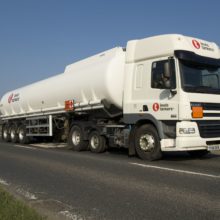
The company’s performance is now ahead of the original five year business plan the directors prepared following their management buyout in 2009.
Significant new additional business with Kuwait, World Fuel Services, Univar, and Brenntag, contributed to revenue growth while the company has implemented a new operational control system linked to improved telematics, which has led to significant operational efficiencies.
The company continues to focus on key market sectors – ground fuels, aviation fuels, gases and specialty chemicals – and during the year restructured its management team to improve market focus by bringing together operational and commercial responsibilities.
As in the previous two years, business started poorly in 2012 due to unseasonal good weather which affected volumes in fuel distribution, especially in Scotland. However, trading in other sectors has remained strong and the company expects to hit its financial targets for the year.
Managing director Stewart MacDonald commented: “We are pleased with our 2011 performance and are confident that we can continue to successfully develop the company. We continue to sign new business and our pipeline remains very strong for the balance of the year and beyond. With that in mind we are continuing to invest in new people and new vehicles. Staff numbers have grown from 108 to 120 and our tanker fleet has increased from 71 to 85.
“Probably the biggest challenge now facing us is to determine our geographical strategy. Increasingly, we are producing new business opportunities outside our traditional operating locations in the north of England and Scotland, and we need to find sensible solutions – probably by small-scale acquisitions.”

